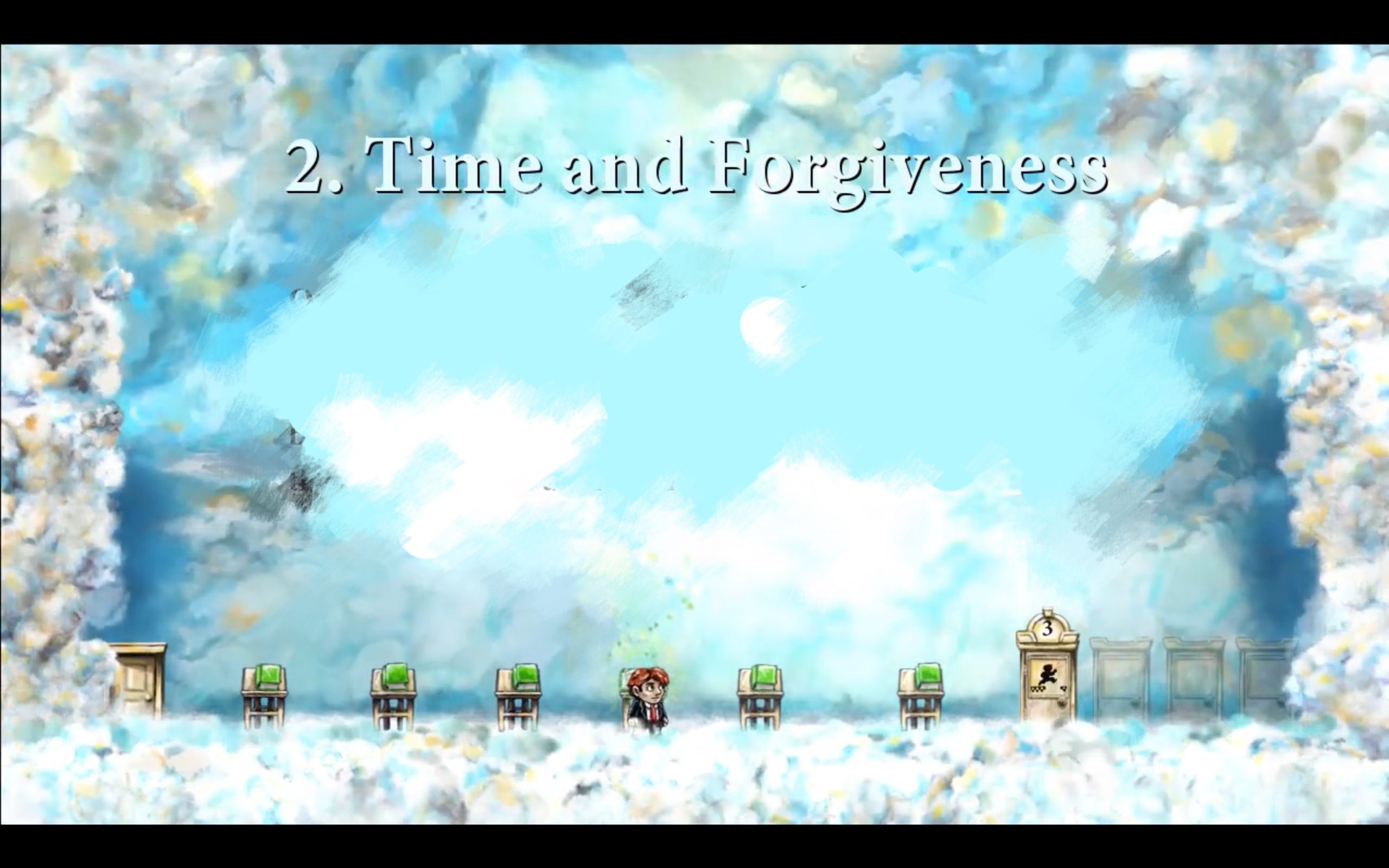During my first gameplay of Braid, I found myself lost in the well-lit, beautifully blurred sceneries of Braid until the spiky fire pits and cruel cannonballs set me on flame. Later I found those are only the welcoming messages from the dark side of the game: a giant burning tree in the background, carefully carved silver platforms that resemble a coffin in world six, and the mind-blowing epilogue that finally unveils Tim as the ultimate villain. “Now we’re all sons of bitches.” Messages of such evoke me to rethink how Braid uses the elimination of death as an intriguing mechanic for Tim to attain forgiveness and its hidden connotations.
It’s not uncommon for games to set the protagonist as the real villain who orchestrates everything. As we know guilt is one of the most self-destructive emotions, games of this type also tend to go down the path of darkness and horror. [spoiler alert] In the video game Devotion (2019) which I played for another class, the entire storyline unfolds with the father’s efforts to seek redemption after the murder of his own daughter. The distorted reality, parallel spaces that span across timelines, blood that can’t be washed off one’s hand, illuminating objects indicative of one’s desperate wish for extrication – extreme wrongs demand extreme solutions for relief.
Braid takes a completely different approach for our protagonist, an approach perhaps too forgiving to mask all the invisible costs and injuries that underly it. Making progress in the game inherently requires the player to make things right (or at least a substantial part of it if one isn’t a completionist). When Tim is hit and falls to the edge of the screen, time-freezing mechanic comes into speedy rescue and signals salvation with the Shift button. This power, however, as we see with our advancement into different worlds, does come at its own limitations: you may reverse time, but something may remain unchanged and gone if you miss it. You may also not mold it however you like, but the progression of things is strictly aligned with the direction of Tim’s footsteps. Moreover, unlike games like Devotion which associate levels with important, peculiar story items such as a storybook or the plantation of a flower, challenges in Braid are built exactly upon those limitations – limitations that tie deep with Tim’s superpower. It forms a magic loop wherein the one imperium that Tim relies on constitutes his obstructions.
This connotation appears even more conspicuous and deep-rooted when we speed play the parts of the clouds on YouTube (say, at 2x). We see a gathering billow of clouds, so packed up as if the space is sealed in them. When the weight of death becomes non-existent in the game, Tim is lifted in the air, high among the clouds. But to stay in the air is at once both the reward and curse of the elimination of death – Tim has to conquer all its limitations to gain prolonged rest in them (moving from one world’s cloud space to another). And since we can only enter the clouds by opening up house doors, Tim seems essentially trapped in the clouds: the presumably intimate home spaces become halts, the once familiar rooms become frames of awkward confinement. Where do we seek meaning from now on?
This points back to the primal question that Blow raises in the game trailer and a question that many of us wondered: what would you become if endowed with the ability to (limitedly) mold time? One cannot die now, and after drubbing one’s own flaws down this route, what destination will we finally arrive at? We traversed through floating clouds and climbed up high ladders to get to the end of the game, can we descend back to the ground to valorize ourselves again? These mysteries remain unsolved since, in the game, Tim is forever trapped in the narrow rooms taken up by no real furniture but puzzle pieces (some of the furniture seem scattered around), or worse, landscapes full of past war marks – only the attic and bathroom seemingly retain their true faces. The name “braid” always fixes a trick or a deception. Where are we now?


I think that the idea about how Braid presents its protagonist with a game mechanic that incentivizes and provokes high reliance but at the same time constitutes his own obstruction is really useful in thinking about the game in terms of the connotations it has for the Cold War arms race and the ethics of nuclear bombs. This could be an area to dive deeper into, specifically with regards to, on one hand, operational logics and playable models, and on the other hand procedural rhetoric.
To expand on this, I think there is an element of surprise that comes with the anti-death mechanics like reversing time because they are not found in other platformers like Super Mario Bros. There is an expectation that is set due to the genre of the game and then it is subverted. So there exists an element of impossibility within the very mechanics of the game, which I think serves as contrast to demonstrate the true hopelessness of Tim in that he can’t actually change the past—it makes the player more conscious of Tim’s (and humanity’s) limitations. I think this is a good example of how genre can make the game more enriching.